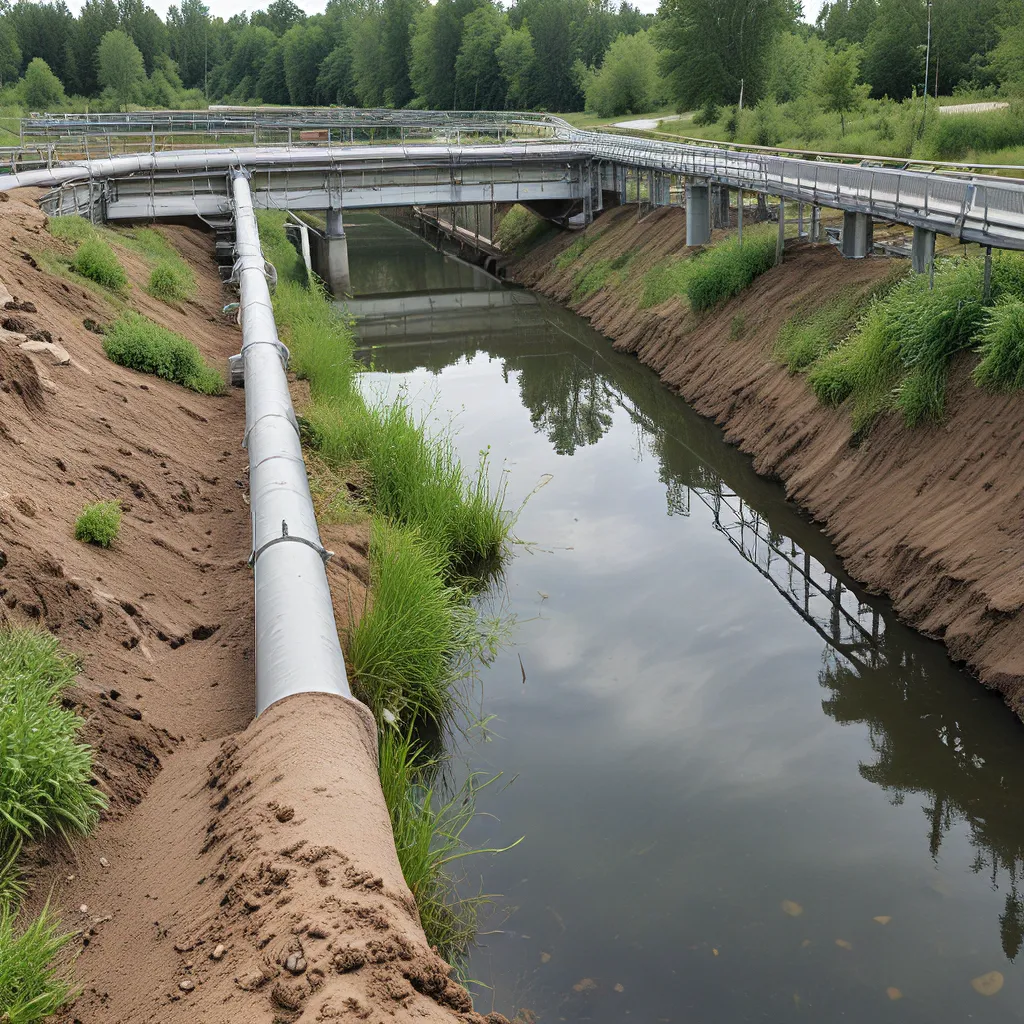
As a concerned citizen, I’ve been closely following the growing water crisis impacting cities around the world. From Bogotá, Colombia to Cape Town, South Africa, the specter of taps running dry has become a terrifying reality for millions. But amidst this grim landscape, I’ve discovered a glimmer of hope – the power of nature-based solutions to transform our wastewater infrastructure and secure a more sustainable water future.
Restoring Forests, Reviving Water Supplies
It’s no secret that climate change and deforestation are the primary culprits behind this global water shortage. As temperatures rise and rainfall patterns grow more erratic, our traditional gray infrastructure – dams, reservoirs, and water treatment plants – simply can’t keep up. And with 180 million Americans relying on forested lands for their drinking water, the loss of these vital ecosystems is only exacerbating the crisis.
But what if I told you that nature itself holds the key to solving this problem? By protecting, restoring, and sustainably managing the forests within our watersheds, we can dramatically improve both the quality and quantity of our water supplies. It’s a simple, yet profoundly powerful concept, and cities like Bogotá, Vitória, Nairobi, and Delhi are already leading the way.
In Bogotá, for instance, the local water utility has discovered that investing just $53 million in ecosystem restoration could save them a staggering $45 million over the next 30 years. How? By reducing the amount of sediment and nutrients in the water, they can cut back on costly dredging and water treatment processes. It’s a win-win scenario that not only improves the city’s water security but also creates new jobs and supports the local environment.
Harnessing the Power of Wetlands
But the benefits of nature-based solutions don’t stop there. In Nairobi, Kenya, the Nairobi Rivers Commission is spearheading a plan to rejuvenate and restore the Nairobi River, recognizing the vital role these waterways play in providing clean drinking water and hydroelectric power to the city’s over 4 million residents.
By strategically reforesting areas along the river and integrating constructed wetlands into the urban landscape, the commission aims to tackle the dual challenges of water pollution and flood risk. Wetlands, you see, are natural powerhouses when it comes to water filtration and stormwater management. They can capture and slow the flow of rainwater, allowing it to soak into the ground and recharge vital groundwater supplies.
And the benefits don’t stop there. These lush, green spaces also create new micro-habitats for plants and wildlife, supporting local biodiversity and enhancing the overall health of the ecosystem. It’s a holistic approach that addresses water security, climate resilience, and environmental preservation all at once.
Taming Stormwater with Sustainable Drainage
Of course, not every nature-based solution requires vast tracts of land. In India, the TheCityFix Labs initiative is working with local partners to showcase innovative, space-efficient alternatives. Take the work of Padma Clean Environs, for instance, who have developed a sustainable drainage system that uses vegetation and engineered soil to naturally filter and recharge groundwater.
This ingenious approach not only reduces the strain on India’s overtaxed water treatment facilities but also helps to offset the impact of the country’s rapidly expanding cities. By allowing stormwater to soak back into the ground, rather than rushing into overburdened drains and rivers, these systems help to maintain the balance of the hydrological cycle and ensure a more reliable, long-term water supply.
The Economic Case for Natural Infrastructure
And let’s not forget the economic benefits of investing in nature-based solutions. As I mentioned earlier, Bogotá’s water utility is poised to save millions by embracing these green approaches. But they’re not the only ones. A recent study by the World Resources Institute examined the potential water and cost savings of combining natural and traditional infrastructure in five Brazilian cities, as well as Bogotá.
The results were nothing short of astounding. In Espírito Santo, Brazil, for example, the researchers found that reforesting just 2,500 hectares of degraded land could prevent the equivalent of 40 dump trucks’ worth of sediment from reaching the local rivers each year. This not only improves water quality but also reduces the utility’s costs for dredging and water treatment.
Overcoming the Challenges
Of course, implementing nature-based solutions isn’t without its challenges. Securing buy-in from stakeholders, navigating complex regulatory frameworks, and ensuring long-term maintenance and monitoring can all present significant hurdles. But as the cities I’ve highlighted have demonstrated, these obstacles are not insurmountable.
In Nairobi, for example, the Nairobi Rivers Commission is working closely with community groups and local businesses to identify priority areas for restoration and find ways to integrate nature-based solutions into urban planning. And in India, the TheCityFix Labs initiative is supporting local projects that demonstrate the feasibility and scalability of these green approaches, paving the way for wider adoption.
A Sustainable, Nature-Inspired Future
As I delve deeper into this topic, I’m struck by the realization that the solutions to our water woes may have been staring us in the face all along. By harnessing the power of nature, we can not only secure a more reliable and sustainable water supply, but also restore the health of our ecosystems and build resilience against the impacts of climate change.
It’s a future that excites and inspires me, one where cities like Bogotá, Vitória, Nairobi, and Delhi are at the forefront of a water revolution. And with the right investments, collaborations, and a little bit of creative thinking, I believe we can make this vision a reality.
So, if you’re like me and concerned about the growing water crisis, I encourage you to explore the possibilities of nature-based solutions. After all, the key to our water-secure future may just be found in the very landscapes we seek to protect.
Alpha Wastewater is a leading provider of innovative wastewater treatment solutions, committed to helping communities build a more sustainable water infrastructure. To learn more about our services, visit our website today.